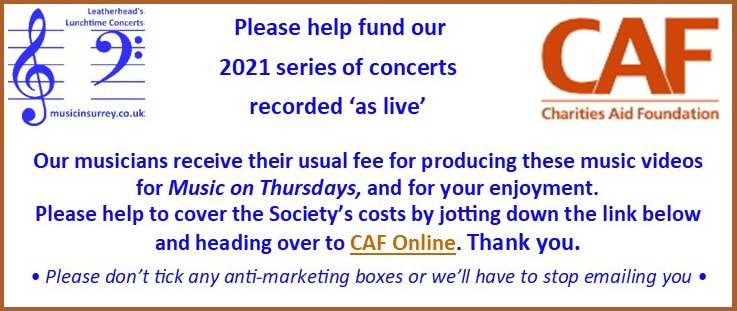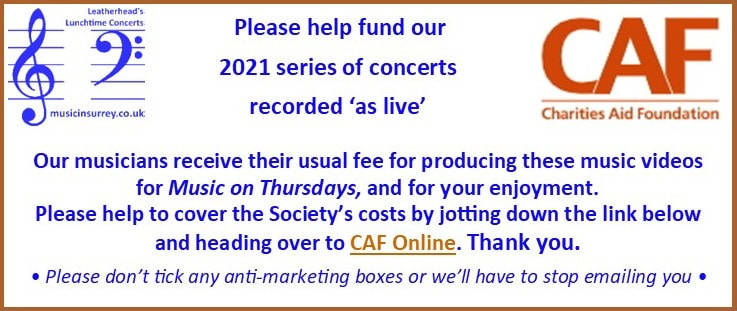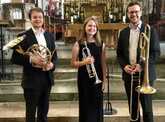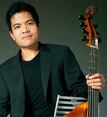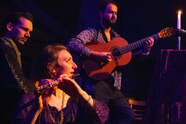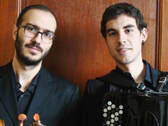Music on Thursdays - Online
Thursday 13th May 2021
String Quartets
Available: from Thursday 13th May
Guest host: Lynda Chang
Guest host: Lynda Chang
♫ ───────────────────────────────────
Programme
String Quartets
Franz Joseph Haydn (1732-1809)
from String Quartet No 62 in C major 'Emperor' Op76 No 3 (1797)
II Poco adagio, cantabile rather slow, song-like
Pyotr Ilych Tchaikovsky (1840-1893)
from String Quartet No 1 in D (1871)
II Andante cantabile gentle walking speed, songlike
Bedřich Smetana (1824-1884)
from String Quartet No 1 in E minor 'From my Life' (1876)
I Allegro vivo appassionato fast, lively and passionate
Franz Peter Schubert (1797-1828)
from String Quartet No 14 'Death and the Maiden' (1824)
I Allegro fast
Joseph Maurice Ravel (1875-1937)
from String Quartet in F major M35 (1902-03)
II Assez vif, très rhythmé fairly fast, very rhythmical
AGGIUNTIVO EXTRA
Maurice Ravel
String Quartet in F major M35 (1902-03)
I Allegro moderato, tres doux moderately fast, very soft
II Assez vif, très rythmé fairly fast, very rhythmical
III Très lent very slow
IV Vif et agité lively and restless
Concert duration: 45 minutes
Ravel Extra: 28 minutes
from String Quartet No 62 in C major 'Emperor' Op76 No 3 (1797)
II Poco adagio, cantabile rather slow, song-like
Pyotr Ilych Tchaikovsky (1840-1893)
from String Quartet No 1 in D (1871)
II Andante cantabile gentle walking speed, songlike
Bedřich Smetana (1824-1884)
from String Quartet No 1 in E minor 'From my Life' (1876)
I Allegro vivo appassionato fast, lively and passionate
Franz Peter Schubert (1797-1828)
from String Quartet No 14 'Death and the Maiden' (1824)
I Allegro fast
Joseph Maurice Ravel (1875-1937)
from String Quartet in F major M35 (1902-03)
II Assez vif, très rhythmé fairly fast, very rhythmical
AGGIUNTIVO EXTRA
Maurice Ravel
String Quartet in F major M35 (1902-03)
I Allegro moderato, tres doux moderately fast, very soft
II Assez vif, très rythmé fairly fast, very rhythmical
III Très lent very slow
IV Vif et agité lively and restless
Concert duration: 45 minutes
Ravel Extra: 28 minutes
♫ ───────────────────────────────────
|
We need your help to fund our concerts recorded 'as live' by professional musicians |
♫ ───────────────────────────────────
String Quartets
Greetings,
String quartets are not everyone's cup of tea. For a long time, they were not mine. And for me, there was no single Damascene moment. What happened, over time, was that my fondness for the orchestral sound led me to appreciate the pared down essence that was the string quartet. And of course, there was the phenomenal repertoire.
A string quartet is made up of 2 violins, 1 viola, and 1 cello. Haydn was the first major composer to write for this combination of instruments - something which happened quite by chance when he, as an 18 year-old budding composer, was asked to write something for the instruments available at a particular gathering. The outcome was so well received that he carried on composing for this set-up, eventually leaving a legacy of almost 70 string quartets, considered by many to be gems of the genre. Mozart, Beethoven and Schubert all loved the format and created great works that have stood the test of time.
Most string quartets have four movements in the 'normal' sequence of fast / slow / dance-like / fast. The format of our online programme restricts me to introducing only one movement of each work in succession. Otherwise, one single composition would take over the entire concert. I really hope that those of you who are moved by one or other of the works will go in search of their full-length version - so many are available on youtube.
I will start with the grandfather of string quartets. The Emperor.
Composed by Haydn in 1797 as a birthday anthem to the Hapsburg Emperor, Francis II, the tune was adopted as Austria's national anthem for more than a century. With a different set of words, it later became the German national anthem from 1922 on.
This movement uses the Emperor tune, which is where the quartet's nickname came from. Its 'theme and variations' format features each instrument playing the theme in turn with the others providing various decorative and counter melodies in support.
String quartets are not everyone's cup of tea. For a long time, they were not mine. And for me, there was no single Damascene moment. What happened, over time, was that my fondness for the orchestral sound led me to appreciate the pared down essence that was the string quartet. And of course, there was the phenomenal repertoire.
A string quartet is made up of 2 violins, 1 viola, and 1 cello. Haydn was the first major composer to write for this combination of instruments - something which happened quite by chance when he, as an 18 year-old budding composer, was asked to write something for the instruments available at a particular gathering. The outcome was so well received that he carried on composing for this set-up, eventually leaving a legacy of almost 70 string quartets, considered by many to be gems of the genre. Mozart, Beethoven and Schubert all loved the format and created great works that have stood the test of time.
Most string quartets have four movements in the 'normal' sequence of fast / slow / dance-like / fast. The format of our online programme restricts me to introducing only one movement of each work in succession. Otherwise, one single composition would take over the entire concert. I really hope that those of you who are moved by one or other of the works will go in search of their full-length version - so many are available on youtube.
I will start with the grandfather of string quartets. The Emperor.
Composed by Haydn in 1797 as a birthday anthem to the Hapsburg Emperor, Francis II, the tune was adopted as Austria's national anthem for more than a century. With a different set of words, it later became the German national anthem from 1922 on.
This movement uses the Emperor tune, which is where the quartet's nickname came from. Its 'theme and variations' format features each instrument playing the theme in turn with the others providing various decorative and counter melodies in support.
|
|
Franz Joseph Haydn (1732-1809)
from String Quartet No 62 in C major 'Emperor' Op76 No 3 (1797) II Poco adagio, cantabile rather slow, song-like (7m25) performed live by the Veridis Quartet Yoonhee Lee • Laura Liu, violins Stephen Laraia, viola • Daniel Mitnitsky, cello in the Jordan Hal of the New England Conservatory, Boston Massachusetts, in May 2013 |
♫ ───────────────────────────────────
The melody of this second movement is based on a folk tune. It is said that, on hearing it at a tribute concert for him, Tolstoy was so moved that he burst into tears. I am knocked out by it every time, but even more so when it is delivered by an outstanding ensemble.
This performance by the Borodin Quartet is meltingly beautiful. It is sweet and simple, glorious and haunting. Most of all, it is a perfect illustration of the unanimity of a single mind in quartet playing - a feat that differentiates the good from the superb.
When I hear quartet playing of this calibre, it always brings to mind Vikram Seth's novel, An Equal Music (1999). This examines in microscopic and loving detail the mechanics and relationships involved in the shared crafting of music among four people.
This performance by the Borodin Quartet is meltingly beautiful. It is sweet and simple, glorious and haunting. Most of all, it is a perfect illustration of the unanimity of a single mind in quartet playing - a feat that differentiates the good from the superb.
When I hear quartet playing of this calibre, it always brings to mind Vikram Seth's novel, An Equal Music (1999). This examines in microscopic and loving detail the mechanics and relationships involved in the shared crafting of music among four people.
|
|
Pyotr Ilych Tchaikovsky (1840-1893) from String Quartet No 1 in D (1871) II Andante cantabile gentle walking speed, songlike (7m18) performed by the Borodin Quartet |
♫ ───────────────────────────────────
Smetana completed this work after he became deaf - a condition that did not stop him composing during his final years. Each movement is a biographical sketch from parts of his life, describing youth, joy, passion, as well as his fast developing deafness. He is revered in his own country as the 'Father of Czech music', supplanting Dvořák - whose music is better known internationally.
This performance by the Pavel Hass Quartet is dramatic, exciting, and full of colour. The video is clearly directed by someone with less interest in the music and musicians than his own craft. But the performance is definitely worth listening to. Perhaps with eyes firmly closed.
This performance by the Pavel Hass Quartet is dramatic, exciting, and full of colour. The video is clearly directed by someone with less interest in the music and musicians than his own craft. But the performance is definitely worth listening to. Perhaps with eyes firmly closed.
|
|
Bedřich Smetana (1824-1884) from String Quartet No 1 in E minor 'From my Life' (1876) I Allegro vivo appassionato fast, lively and passionate (8m23) performed by the Pavel Haas Quartet: Veronika Jarůšková, 1st violin • Marek Zwiebel, 2nd violin Pavel Nikl, viola • Pater Jarůšek, cello |
♫ ───────────────────────────────────
When Schubert first realised in 1824 that he was suffering from syphilis (and therefore dying), he sat down and produced two memorable string quartets. Whilst the 'Rosamunde' quartet is an essentially melancholy work, 'Death and the Maiden' reflects a welter of emotions - from shock and anger to despair and poignant memories of the beauty of life.
The title 'Death and the Maiden' comes from a song that he had written in 1817 whose melody becomes the main theme of the second movement. The song sets out the maiden's fear of death and the comforting words from Death itself. I have chosen to play the first movement for its driving, compelling drama and moments of lyricism which, thus juxtaposed, come with a bitter sweetness.
I'm sorry that the following recording is audio only. My justification lies in the quality of the performance from the Takacz Quartet. The stark unison opening is like an anguished cry from the heart with the Takacz convincing us of the depth of this emotion without ever losing sight of the beauty of the music.
The title 'Death and the Maiden' comes from a song that he had written in 1817 whose melody becomes the main theme of the second movement. The song sets out the maiden's fear of death and the comforting words from Death itself. I have chosen to play the first movement for its driving, compelling drama and moments of lyricism which, thus juxtaposed, come with a bitter sweetness.
I'm sorry that the following recording is audio only. My justification lies in the quality of the performance from the Takacz Quartet. The stark unison opening is like an anguished cry from the heart with the Takacz convincing us of the depth of this emotion without ever losing sight of the beauty of the music.
|
|
Franz Peter Schubert (1797-1828) from String Quartet No 14 'Death and the Maiden' (1824) I Allegro fast (15m13) performed by the Takács Quartet: Gábor Takács-Nagy • Károly Schranz violins Gabor Ormai, viola • Andras Fejér, cello |
♫ ───────────────────────────────────
Ravel composed only one string quartet and this was at the age of 28. For me, this is one of the most beautiful works in the repertoire. Compared with the others that we have listened to so far this music is unmistakably French in its delicacy, sensuousness and kaleidoscopic changes of colour through harmony and articulation.
I have purposely chosen the second movement which begins and ends with extensive pizzicato - that is, the strings are plucked, not bowed. This, together with strumming (unheard of in the Teutonic tradition), create an amazing sense of fleet-of-foot excitement.
I have purposely chosen the second movement which begins and ends with extensive pizzicato - that is, the strings are plucked, not bowed. This, together with strumming (unheard of in the Teutonic tradition), create an amazing sense of fleet-of-foot excitement.
|
|
Joseph Maurice Ravel (1875-1937) from String Quartet in F major M35 (1902-03) II Assez vif, très rhythmé fairly fast, very rhythmical (6m00) performed by the Emerson String Quartet |
♫ ───────────────────────────────────
AGGIUNTIVO EXTRA
For those who feel sufficiently inspired, here is the link for the whole work performed by the Emerson Quartet. I promise you an exhilarating listening experience.
For those who feel sufficiently inspired, here is the link for the whole work performed by the Emerson Quartet. I promise you an exhilarating listening experience.
|
|
Maurice Ravel
String Quartet in F major M35 (1902-03) (28m) I Allegro moderato, tres doux moderately fast, very soft II Assez vif, très rythmé fairly fast, very rhythmical III Très lent very slow IV Vif et agité lively and restless performed by the Emerson String Quartet |
Finally, I must apologise to those who have searched in vain for something by Beethoven whose string quartets undoubtedly stand at the pinnacle of the genre. But that's it really - how could I possibly choose one or even two examples when so much of it is impossibly awesome and intellectually challenging?
I hope you have enjoyed today's offerings nevertheless.
I hope you have enjoyed today's offerings nevertheless.
♫ ───────────────────────────────────
We hope you have enjoyed Lynda Chang's String Quartets Selection for Music on Thursdays
Lynda is our host again next Thursday when her subject
will be the music of Stravinsky
We continue with these weekly video selection concerts until the end of June
with hopes of going live at Leatherhead Methodist Church from July 1st
The first Thursday in June will be a special 'as live' recording for Music on Thursdays
3rd June: Iñigo Mikeleiz Berrade, accordion
comments welcome: [email protected]
Lynda is our host again next Thursday when her subject
will be the music of Stravinsky
We continue with these weekly video selection concerts until the end of June
with hopes of going live at Leatherhead Methodist Church from July 1st
The first Thursday in June will be a special 'as live' recording for Music on Thursdays
3rd June: Iñigo Mikeleiz Berrade, accordion
comments welcome: [email protected]
|
▼ last week's 'as live' recording ▼
|
▼ next week's selection ▼ (not yet active)
Stravinsky & Disney - a match made in heaven ? |
♫ ───────────────────────────────────
We need your help to fund our concerts recorded 'as live' by professional musicians
|
► Did you listen ?
►Did you remember to give afterwards ? Here is a further chance to do so If the concerts cover their costs we will be able to do more. Please donate now ! Many thanks to those who have donated already. You set us all a great example ! |
♫ ───────────────────────────────────
|
Apr 1st
|
Feb 25th
|
Oct 29th
|
Oct 22nd
|
Oct 15th
|
Oct 8th
|
Oct 1st
|
♫ ───────────────────────────────────────
♫ ───────────────────────────────────────
♫ ───────────────────────────────────────
♫ ───────────────────────────────────────







